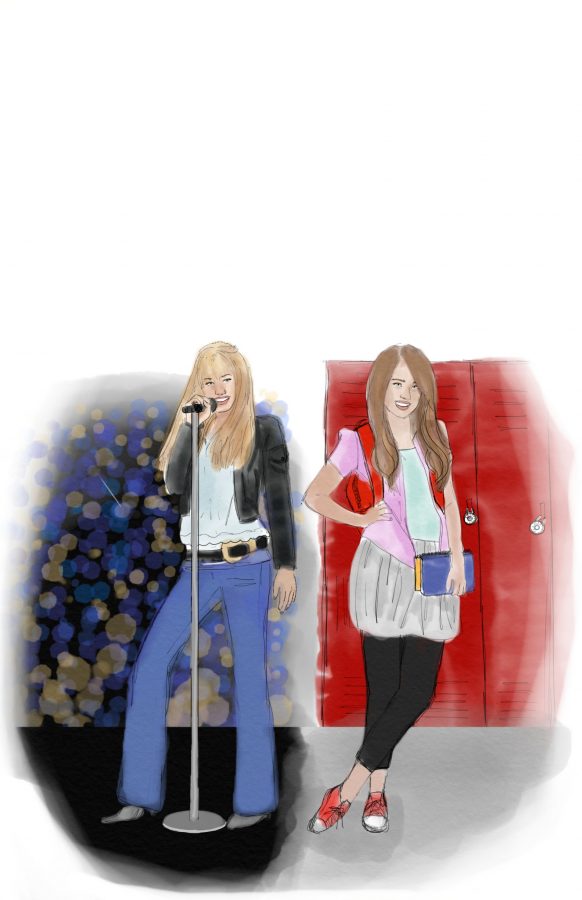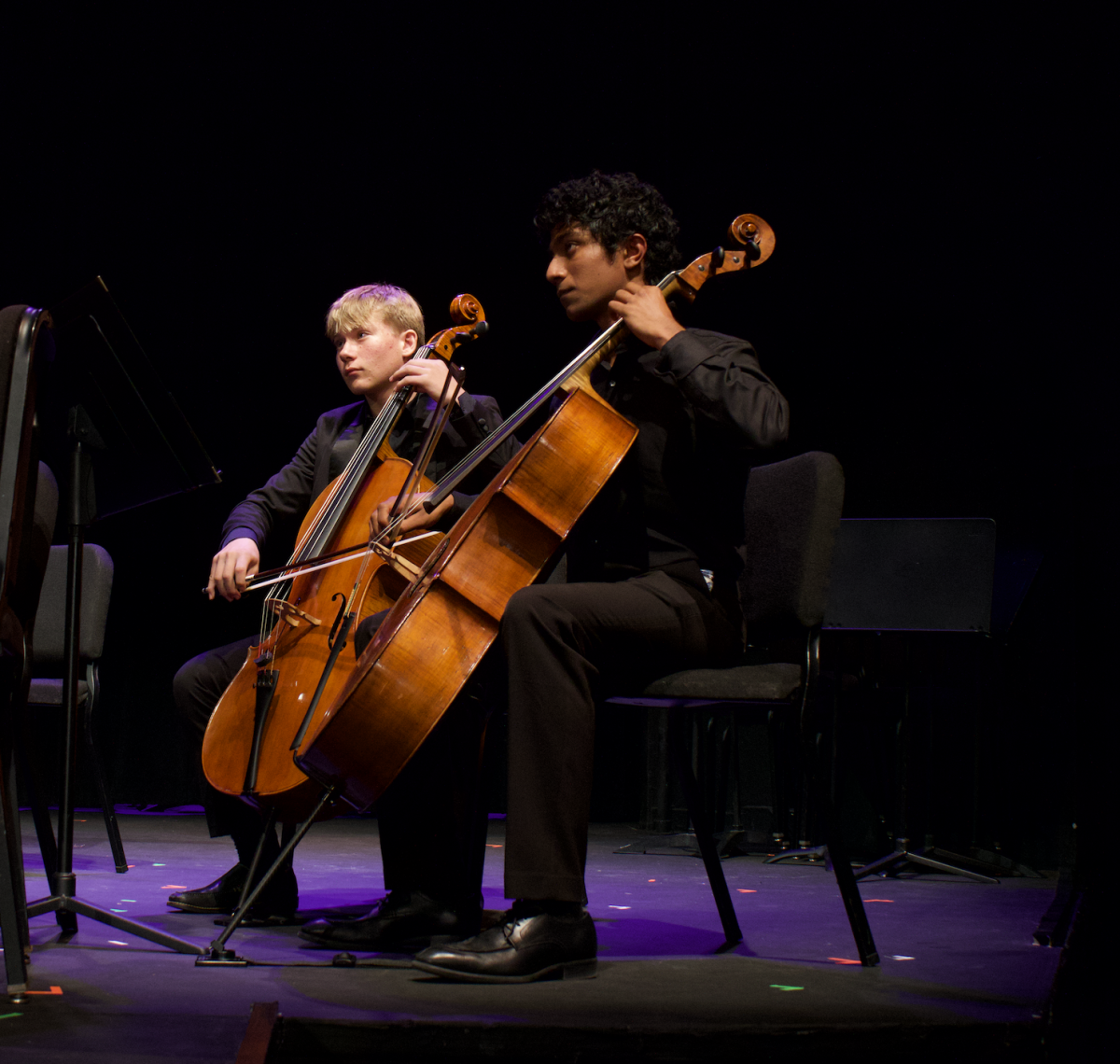At 11 p.m., when Tyler Ganus ’20 was eating dinner, he had already finished a lift session that began 5:30 that morning, a four-and-a-half hour long television shoot for Disney XD’s “Walk The Prank,” four hours of school, three hours of Varsity Baseball practice, rehearsal for the school play and a piano lesson.
“[That was] a crazy day,” Ganus said. “I had to make sure I coordinated with my agent, directors, coaches and teachers a few days in advance to stay ahead of the curve.”
Ganus has been on “Walk the Prank,” a show that follows a group of kids as they perform over-the-top pranks and that combines scripted comedy with real hidden-camera pranks, for the past three seasons, and was a voice actor for “Monster’s University,” “Wreck-it Ralph” and “South Park.” Ganus said that writing out a daily schedule is what helps him stay on track while pursuing a career outside of school.
“I have to make [schedules] every single day in order to keep pursuing multiple passions,” Ganus said. “In addition to music and acting, I have been playing baseball at a very high level my whole life. I was fortunate enough to play on Team USA when I was 12 and I currently play for the Harvard-Westlake baseball team. By writing out everything that must be done throughout the day and week, I am able to prioritize my activities with short-term and long-term goals.”
Other students who, like Ganus, are trying to pursue non-school related careers said that trying to simultaneously manage both school and an entirely separate career can be daunting. Ava Benavente ’20, who is pursuing a career in acting, said that excitement for a movie audition was turned into anxiety the moment she realized how unprepared she was for her test the next day.
“I knew I wasn’t going to be able to give my full attention to school work and acting at the same time,” Benavente said. “I knew that the audition was going to take priority [because] I submitted [for] it and because I am very committed to my career. Auditions are a big deal and are very exciting, so I knew I wasn’t going to have time to study for that test.”
Benavente said the possibility of having to miss large portions of school for a job is what worries her most about having an acting career.
Upper School Student Discipline and Attendance Coordinator Gabriel Preciado, said that all students are expected to fulfill the same requirement of missing no more than 20 classes, but case-by-case exceptions are a possibility.
“There are possibilities where a Dean and the Head of School might agree on something, but that’s on a special case basis based on what they see and look at,” Preciado said. “Perhaps when someone is on a professional level, if there is something they’re certainly pursuing soon after Harvard-Westlake, that’s when, from what I know, the school might make other exceptions.”
Trying to create a successful balance between school and an outside career is also something that singer-songwriter Graham Berger-Sacks ’20 said he works towards. Berger-Sacks said that trying to juggle both school and his musical pursuits was a challenge, but he has learned to view pursuing music as his own activity.
“It’s a difficult balance,” Berger-Sacks said. “It takes a lot of time, but essentially everyone has commitments, and music is like my sport. I put the same amount of time into my music as anyone else would put into their basketball or other activity. Obviously, it takes up a lot of time, but I wouldn’t have it any other way.”
While he has always had an interest in music, Berger-Sacks said he only began coming out with his own music about a year ago after his parents got him a home studio for his birthday. Now that he is creating his own music, Berger-Sacks said all the work has to be done outside of school.
“[The home studio] is where I’ve been spending all my time working on music, and once I was able to begin that process, I knew I was going to start putting music out,” Berger-Sacks said. “For my process, I begin by producing at my home studio, and then when I have a song I really like, I go into a professional studio to get the song mixed and finished and to tweak it around.”
Less than half a year after the release of his first song “Show You Some Love,” Berger-Sacks now has over 18,000 monthly listeners on Spotify, with his most popular song, “Pain On My Mind,” earning over 179,000 plays. Like Berger-Sacks, Benavente said she only recently began to truly pursue a career outside of school. Benavente started acting in elementary school with voice-overs but said acting began taking up a substantial portion of her time this past year, when she booked a larger project. Benavente said she now has had to learn to balance her time between school, auditions and meetings with her agent.
“I think that Harvard-Westlake is already an especially difficult environment when it comes to just school, so it is really hard to try and pursue a career outside of it,” Benavente said. “I think that you have to be really good at time management in order to successfully balance the two. It can be really easy to let school work slip and make one activity a priority over the other.”
Ganus said that meditation has helped him stay focused while balancing many commitments.
“Meditation has been the key to remaining calm and giving me the opportunity to be in control of every moment in my life,” Ganus said. “Being able to take a breath after a test, remain calm before an acting audition and hit every note in a music performance requires a lot of concentration. Meditation has helped me keep a peaceful state of mind, allowing me to continue having fun pursuing my passions.”
On the other hand, students like Echo Seireeni ’21 said they will wait until after high school to fully pursue their artistic interests. Seireeni said she hopes to work in the digital art field—which includes a large variety of things, such as creating and painting three-dimensional scans of her face, digital clothing design and electronic soundtracks—but is planning to wait until she graduates before trying to get a job as an artist.
“I think [trying to expose my art] is not really worth it right now,” Seireeni said. “Especially because in the digital field, the second you release work, you get a lot of offers since it is such a niche thing and not a lot of people are doing it, and I can’t deal with commissions now. It would be a lot with school, and also I still want to work on my actual skill before I put my work out there.”
Seireeni said that like Berger-Sacks, she is unable to fully pursue her art at school. She said that she credits this to the fact that digital art requires less-attainable materials.
“Digital media is extremely difficult to pursue in high school because none of the schools to my knowledge have a full-blown digital program in place for students to follow,” Seireeni said. “It’s understandable given that the materials and programs are highly expensive and become obsolete very quickly, so all of the materials that I do work with have to be borrowed.”
Seireeni said that she believes it is important to portray less traditional jobs just as legitimately as more obvious career choices, and that people should empower students to chose careers they actually care about.
“It’s important to me to break the stereotype of the ‘starving artist,’” Seireeni said. “That stereotype ignores and undermines the huge art market infrastructure in place that offers literally hundreds of varied art-related career options that can pay just as much—or more—than the more traditional jobs students are often urged to consider. In a social system that generally rewards a more linear thinking style and that devalues the importance of original and creative thought, it is great that there is an emphasis and work put into changing the outlook on student artists and people in the art industry.”





























